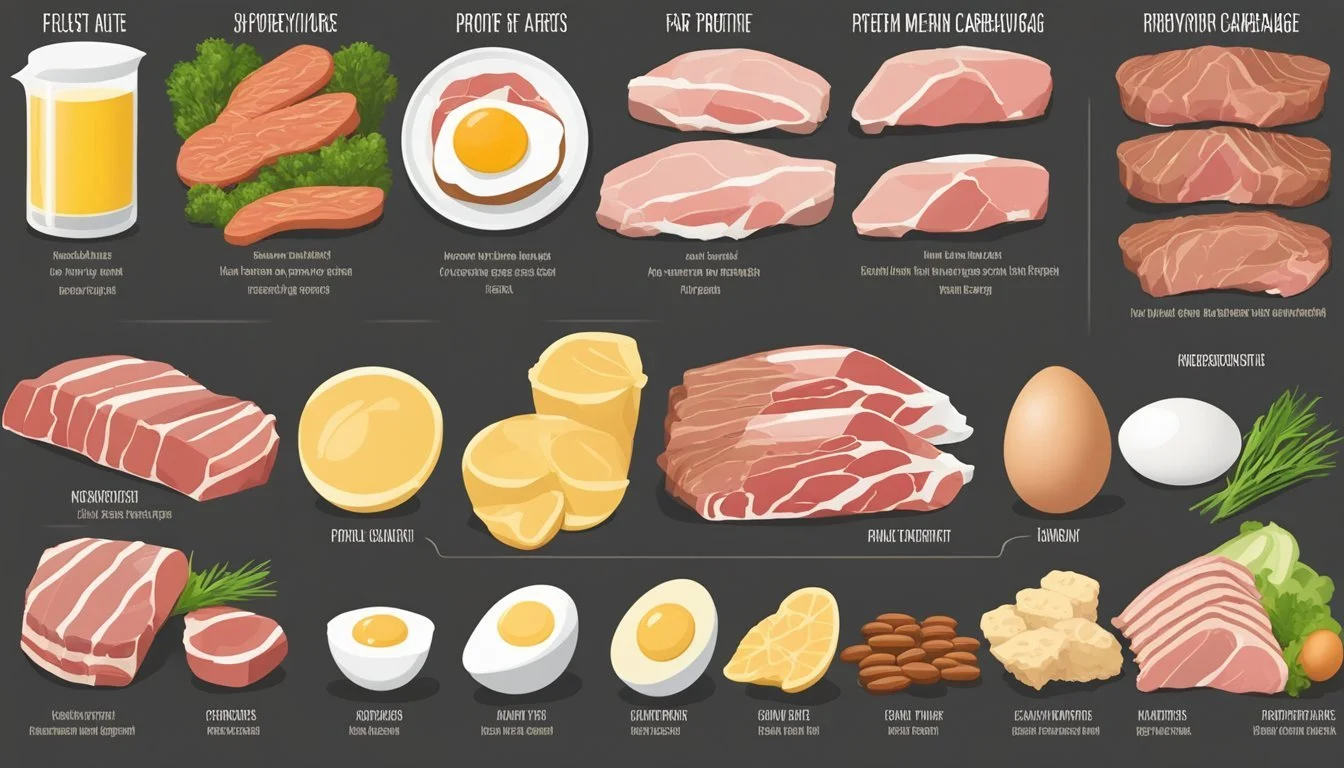Gary Brecka Carnivore Diet
Insights and Impacts on Health
The carnivore diet has gained significant attention in the health and nutrition space, with Gary Brecka emerging as a notable advocate for this approach. The diet centers around the consumption of animal products exclusively, positing that eliminating plant-based foods can lead to improved health outcomes. Advocates like Brecka often argue that a diet rich in animal proteins and fats can be beneficial for metabolic health and may assist in reducing inflammation and certain chronic diseases.
Gary Brecka's specific version of the carnivore diet emphasizes the role of high-quality animal proteins and fats, while suggesting that individuals eliminate most, if not all, carbohydrates. His dietary strategy is part of a larger health philosophy that integrates principles of biohacking and personalized nutrition. By focusing on meat-based nutrition, Brecka's approach aligns with the carnivore diet's overall framework, which is predicated on the belief that human beings thrived historically on animal-based diets.
The Gary Brecka diet, sometimes also known as the 30/30/30 method, introduces a routine where one consumes 30 grams of protein within 30 minutes of waking up, followed by 30 minutes of steady-state cardiovascular exercise. This regimen is not just about food choices but about when and how to eat for optimal metabolic response. Proponents suggest that this method can lead to weight loss and improved fitness, although it is recommended to consult healthcare professionals before undertaking any major dietary changes.
The Carnivore Diet Explained
The Carnivore Diet is an approach that focuses on animal-based foods and eliminates almost all plant-based foods. It posits that a high intake of protein and healthy fats can lead to various health benefits.
Principles and Benefits
The foundation of the Carnivore Diet lies in consuming primarily meat, fish, eggs, and certain dairy products, aiming for high-protein and healthy fats while reducing carbohydrate intake. Macronutrient ratios typically consist of a significant proportion of calories from fats, often ranging from 70-75%, with proteins making up 20-25% and carbohydrates limited to just 5-10% of daily caloric intake. By adhering to this diet, individuals often enter a state of ketosis, a metabolic process where the body burns fat for energy in the absence of carbohydrates.
This diet is based on the belief that early human diets consisted largely of animal products and that modern health issues stem from the relatively recent increase in carbohydrate and processed food consumption.
Health Impacts and Considerations
Although individuals on the Carnivore Diet report improvements in weight loss, mental clarity, and reduced inflammation, it remains crucial to consider the diet's long-term impact on health. A diet comprised almost entirely of animal products can raise concerns regarding nutrient deficiencies, such as in fiber and certain vitamins typically found in plant-based foods. Additionally, the high intake of saturated fats could potentially lead to an increase in cholesterol levels, which is a risk factor for cardiovascular disease.
It's imperative for an individual to monitor their body's response to this diet carefully, to ensure an optimal balance of nutrients, and to consult healthcare professionals to prevent adverse health effects.
Diet Structure and Macronutrients
The Gary Brecka diet is structured with a specific emphasis on macronutrient composition, primarily focusing on a high intake of protein and fats while minimizing carbohydrates. This dietary regimen begins the day with 30 grams of protein and includes prescribed macronutrient ratios that support a ketogenic diet approach.
Protein Focus and Sources
Protein is pivotal in the Gary Brecka diet, with the recommendation to consume 30 grams of protein within 30 minutes of waking. This macronutrient paves the way for muscle maintenance and satiety throughout the day. Quality sources of protein in this diet include:
Eggs
Fats and Their Role
Fats play a significant role in energy provision and hormonal balance on a ketogenic diet. They make up a substantial portion of daily caloric intake, with targets ranging between 70-75% of calories. Healthy fats are encouraged, with an emphasis on:
Avocado
Olive oil
Carbohydrates Exclusion
Carbohydrates are greatly reduced, limited to only about 5-10% of calories. This restriction is key to maintaining ketosis, a state where the body utilizes fat as its primary energy source. Carbohydrate sources are mostly excluded; however, trace amounts may be found in:
Low-carb vegetables
Nuts and seeds
Gary Brecka's Philosophy on Dieting
Gary Brecka, a human biologist, champions a structured diet plan characterized by timed protein intake and specific macronutrient ratios. His philosophy is built on the premise that diet is crucial to optimal health, leveraging the timing of nutrients and their respective proportions to achieve well-being and fitness goals.
Understanding the 30-30-30 Method
Gary Brecka's 30-30-30 method is a cornerstone of his dieting approach. This regimen starts the day with the intake of 30 grams of protein within 30 minutes of waking. The next step is engaging in 30 minutes of low-intensity exercise. This pattern aligns with Brecka's belief that such a routine can kickstart metabolism and support stable blood sugar levels throughout the day, laying the groundwork for effective weight management and improved health.
Incorporating High Fat and Moderate Protein
In alignment with the 30-30-30 method, Gary Brecka advocates for a diet rich in high-quality fats and moderate protein. His prescribed macronutrient ratios typically recommend:
70-75% calories from fat
20-25% calories from protein
5-10% calories from carbohydrates
By promoting a high fat intake and ensuring protein is moderate rather than excessive, Brecka's diet is designed to enhance satiety, support metabolic processes, and maintain muscle mass. The emphasis on high-quality sources of fat and protein is indicative of his commitment to not just weight loss, but overall health.
Dietary Recommendations and Foods to Include
The Gary Brecka diet emphasizes a substantial intake of proteins, healthy fats, and a selection of fiber-rich vegetables to support overall health. Here is a breakdown of the recommended foods to include in the diet.
Recommended Protein Sources
Proteins are a cornerstone of the diet, and should be consumed in ample amounts for their crucial role in building and repairing tissues. Consumers should focus on:
Organic meats: Grass-fed beef, organic chicken, and turkey.
Wild-caught fish: Salmon, mackerel, and trout for their high omega-3 content.
Eggs: A complete protein source and versatile in meals.
Selecting Healthy Fats and Oils
Fats are a primary energy source on this diet. It is important to choose fats that contribute to overall health:
Nuts and seeds: Almonds, walnuts, chia seeds, and flaxseeds for omega-3s.
Oils: Olive oil and avocado oil for cooking.
Avocados: A nutrient-dense source of monounsaturated fats.
Importance of Vegetables and Fiber
Fiber is critical in supporting digestive health and maintaining regularity. The diet encourages:
Non-starchy vegetables: Leafy greens like spinach and kale, along with broccoli and cauliflower.
Low-glycemic fruits: Especially those ending in 'berries' such as strawberries and blueberries for their low sugar content and high antioxidant properties.
It is recommended that individuals incorporate these food choices into their daily eating habits to align with the Gary Brecka dietary principles.
Gary Brecka's Take on Supplements and Hydration
Gary Brecka's approach to diet and health heavily emphasizes the importance of targeted supplementation and adequate hydration. Within his dietary framework, he underscores the necessity of essential vitamins and minerals alongside consistent water intake to support overall wellness.
Essential Vitamins and Minerals
In the realm of health and diet, Brecka posits that precision in supplementing with vitamins and minerals is crucial. He advocates for:
Magnesium: Essential for energy production and muscle function.
Vitamin D: Vital for bone health and immune system support.
Omega-3 Fatty Acids: Important for heart health and cognitive function.
He maintains that these supplements, when taken in alignment with a high-protein, low-carb diet, can optimize body functions and enhance health outcomes.
If you're looking for magnesium, vitamin D, and omega-3, buying it online is your best bet!
Staying Hydrated with Water
Hydration is foundational in Brecka's dietary perspective. He encourages consumption of:
Water: Aiming for a minimum of half your body weight in ounces per day.
Brecka asserts that consistent water intake is non-negotiable for flushing toxins and supporting the body's metabolic processes. He recommends starting the day with a significant amount of water to initiate these processes and maintain hydration throughout the day.
Combating Sugar and Processed Foods
This section delves into the detrimental impact of refined sugars and the benefits of choosing whole, unprocessed foods, which are foundational principles of the Gary Brecka carnivore diet.
Dangers of Refined Sugars
Refined sugars, such as those found in many processed foods, contribute to numerous health problems. These sugars can spike insulin levels, leading to energy crashes and fostering a cycle of cravings. A diet high in refined sugars is linked to an increased risk of obesity, type 2 diabetes, and heart disease. For example, white rice and certain types of bread, which are stripped of nutrients during processing, are broken down rapidly into sugar in the bloodstream.
5 Foods to Avoid:
Sugary beverages
White rice
White bread
Pastries and desserts
Certain breakfast cereals
Whole, Unprocessed Foods Emphasis
The Gary Brecka diet emphasizes the inclusion of whole, unprocessed foods which are inherently free from refined sugars and unhealthy fats. Consuming these foods can help regulate blood sugar and support satiety. Grass-fed meats, a staple in the carnivore diet, offer high-quality protein without added sugars.
Healthy Fats to Include:
Olive oil
Avocado oil
In contrast, they avoid seed oils like sunflower and safflower oil, which can be highly processed and may contribute to inflammation. By focusing on nutrient-dense foods and avoiding processed options, individuals can maintain steadier energy levels and improve overall health.
The Role of Exercise within the Carnivore Diet
In the context of the carnivore diet, exercise serves not just as a complement to dietary goals but is integral to overall wellness and metabolic function.
Integrating Physical Activity
On the carnivore diet, individuals should consider physical activity an essential component. This high-fat, low-carbohydrate diet shifts the body's energy utilization towards burning fat for fuel, a process that can be enhanced with strategic exercise routines. Considering the diet's focus on animal products, which are rich in protein, incorporating a mix of resistance training and cardiovascular exercises can support muscle maintenance and growth while promoting fat metabolism.
Resistance Training: Strengthens muscles, enhances bone density, and encourages efficient energy usage.
Cardiovascular Training: Aids in heart health, increases caloric burn, and improves respiratory efficiency.
Benefits of Low-Intensity Exercise
Low-intensity exercise, such as walking or leisurely cycling, fits well within the carnivore diet's regimen.
Steady-State Cardiovascular Activity:
Pros:
Enhances fat oxidation
Suitable for longer durations without overwhelming the system
Scope: Ideally, individuals should aim for 30 minutes following the first meal of the day, harnessing the protein intake for optimal energy usage and recovery.
Regular low-intensity exercise supports cardiovascular health without excessively taxing the body, ensuring that the diet's emphasis on high nutritional protein aids in recovery and sustains energy levels. Additionally, such physical activity can promote blood sugar regulation and improve insulin sensitivity, which may be beneficial given the absence of dietary carbohydrates in a carnivore diet.
Health and Metabolic Outcomes
Gary Brecka's diet approach, specifically a high fat and low carbohydrate diet, is associated with several key metabolic health outcomes. This section examines the influence on blood sugar and insulin, impact on cholesterol and heart disease, and overall promotion of metabolic health.
Influence on Blood Sugar and Insulin
High dietary fat intake and minimal carbohydrates are the hallmarks of the Gary Brecka diet that may lower blood sugar levels and improve insulin sensitivity. By reducing carbohydrate intake, the diet can lead to decreased production of insulin, potentially benefiting individuals with type 1 and type 2 diabetes. The focus on fat and protein can bring about steady energy release and satiety, helping to maintain stable blood sugar levels throughout the day.
Impact on Cholesterol and Heart Disease
The diet's emphasis on high fat consumption, specifically from sources rich in amino acids and healthy fats, aims to influence cholesterol levels. It may increase HDL cholesterol (the "good" cholesterol), which is associated with a lower risk of heart disease. However, discussions on the impact of such diets on LDL cholesterol (the "bad" cholesterol) continue, with the general consensus being that balanced fat intake is crucial for cardiovascular health.
Promoting Metabolic Health
By inducing a state of ketosis through low carbohydrate consumption, the diet encourages the body to burn fat for fuel, which can enhance metabolic health. Proponents suggest that such a metabolic shift can lead to improved mental clarity, energy levels, and an overall sense of well-being. Some evidence points to the role of ketosis in hormone regulation, ultimately influencing various aspects of metabolic health.
Gary Brecka's Success and Influence
Gary Brecka's approach to diet and wellness has garnered significant attention, largely due to the success and expansion of his 10x Health System and his active engagement with a broad audience through social media.
10x Health System
The 10x Health System, originated by Gary Brecka, represents a comprehensive health and wellness framework that has influenced numerous individuals seeking to improve their health. It encompasses various techniques and dietary strategies, including the Carnivore Diet, aimed at optimizing bodily functions and performance. The system's popularity is a testament to Brecka's influence in the health and nutrition space.
Foundational Principles: Holistic health optimization.
Dietary Approach: Emphasis on high protein intake, presumably aligning with carnivore diet principles.
Social Media Presence
Gary Brecka's reach extends beyond direct health services, largely due to his strategic use of social media platforms. He has leveraged these platforms to share insights, tips, and motivate his followers, further expanding his influence.
Platforms: TikTok among others.
Followers: Cultivates a growing number of followers who are engaged with his content and health philosophy.
Content Strategy: Regular posts that offer valuable insights into his diet strategies, personal success stories, and motivational narratives to encourage followers to adopt healthier lifestyles.
Miscellaneous Dietary Considerations
When following the Gary Brecka carnivore diet, individuals must consider how dietary restrictions and allergies could affect their food choices, as well as assess the long-term sustainability of such a diet in accordance with their lifestyle.
Handling Dietary Restrictions and Allergies
For individuals with dietary restrictions or allergies, care should be taken to avoid any inflammatory responses that might be triggered by the Carnivore Diet's emphasis on animal-based products. For example, those with a dairy allergy should omit sources of whey protein and opt for alternative animal-based proteins. It’s important to tailor the diet to one’s specific needs while maintaining the core principles of high protein intake.
Long-Term Sustainability and Lifestyle
An individual must evaluate whether the Gary Brecka carnivore diet aligns with their lifestyle for long-term sustainability. While the diet is rich in protein and fats, those who are vegan will not find it compatible due to its animal-centric food sources. Moreover, its emphasis on meats over plant-based foods could sustainably be questioned by some, considering personal health goals and environmental impacts. If someone adheres to a lifestyle that values the inclusion of diverse foods or vegetarian principles, they should carefully assess the feasibility of this diet for their personal circumstances.
Keeping Informed: The Scientific and Medical Community
In evaluating the Gary Brecka carnivore diet, the scientific and medical community's insights are indispensable. They provide a deeper understanding of the biological impact and nutritional validity consistent with personal health goals.
Biological and Nutritional Research
Brecka's approach banks heavily on understanding human biology and the role of biomarkers in assessing one's metabolic state. Nutritional research underpinning this diet often focuses on how a high protein and low carbohydrate intake might affect the body. Key biomarkers such as blood lipid levels, glucose levels, and blood pressure are monitored to observe changes correlating with the diet’s efficacy.
Consulting with Healthcare Professionals
It is crucial for individuals to engage with healthcare professionals before and during the adoption of specialized diets like the Brecka carnivore diet. Physicians and dietitians can offer guidance tailored to an individual's health status and dietary goals. They ensure that the diet's high reliance on proteins and fats does not exacerbate or lead to health issues.
Utilizing Genetic Testing for Personalization
Genetic testing can play a pivotal role in personalizing the diet to one’s unique genetic makeup. It reveals how an individual might metabolize certain nutrients, respond to different dietary patterns, and their predisposition to health conditions. By aligning the Brecka diet with this genetic information, one can ideally optimize their dietary choices to suit their biology and health aspirations.











